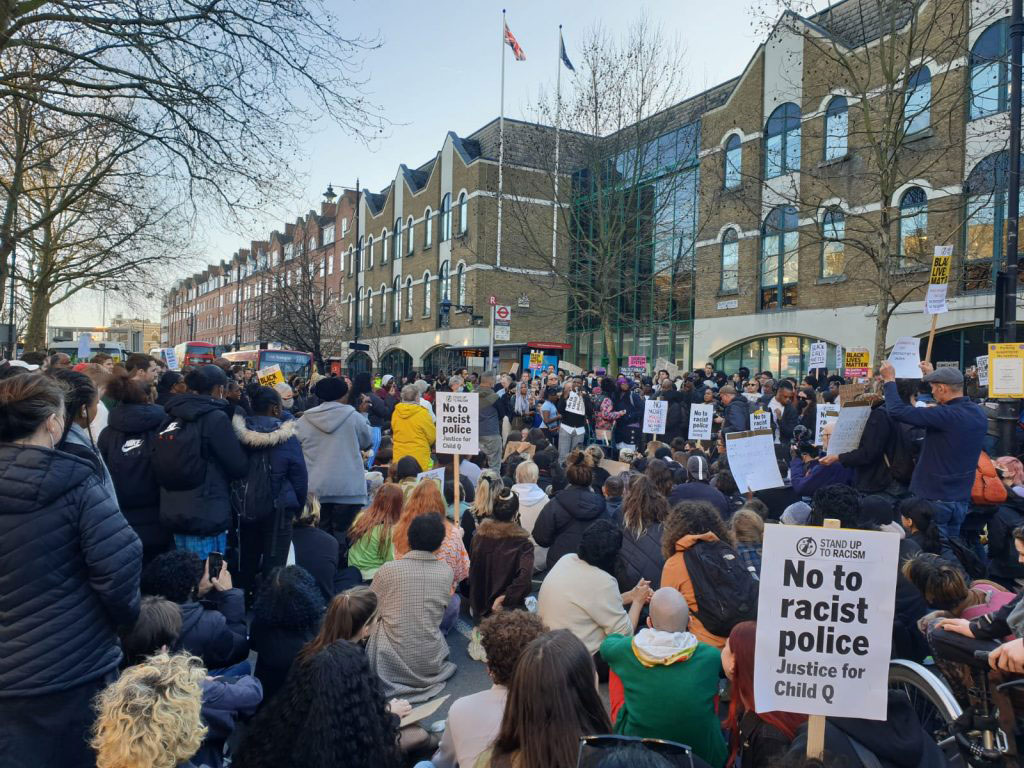

ON FRIDAY 18 March hundreds of school students in Hackney, London interrupted their morning assembly. They were incensed. They would not be silenced. One after another they voiced their anger.
That weekend many of them attended, with their families and friends, a noisy protest and later a respectful vigil outside Stoke Newington police station. More actions have been planned.
They were responding to a child safeguarding report, released the previous Wednesday, that condemned the police for violating a 15 year old black girl’s rights by strip searching her without any other adult present in 2020.
Her ‘crime’? The young woman, known as Child Q, ‘smelt’ of cannabis.
She was not harming anyone at the time. In fact she was sitting an exam in her GCSE year, before teachers pulled her out of the hall. The police then took her into the medical room, by herself, and told her to remove all her clothes for a strip search.
Child Q had told them she was on her period, but rather than making them stop, they asked her to remove her sanitary towel. To the police, she did not represent a child in need of protection, but a black woman. Black teenagers, in their eyes, can be treated like adults, because they all smoke weed, don’t they?
As local MP Diane Abbott said, ‘The Met Police is not going into private schools and asking white girls to spread their buttock cheeks’
Context
The report says the incident should never have been allowed to happen and criticises both the police and the school for not intervening. It says that there were no other similar strip searches in local schools that year.
But it went on to reveal that 299 strip searches were carried out in the area that year and 25 of those were minors; 23 were Black, Asian, Arab or North African; 18 were handcuffed during the process. Most were done on suspicion of possession of drugs. Nobody knows how many were carried out, like Child Q’s ordeal, in isolation and without their parents’ knowledge.
This highlights an epidemic of abuse at the hands of the police, using the ridiculous premise of possible possession, against black youth. Recreational drugs should be legalised. It is a ‘crime’ without a victim. It is a racist law.
Stop and search is routinely used to humiliate and degrade – dehumanise – Black youth on our streets, in our communities, even in our schools. It too should be outlawed.
Where are the unions?
But why are the police routinely welcomed into schools in the first place? In the 1980s there was a strong movement to kick the cops out, but the loosening of any democratic control of the schools through the academy programme has since made educational institutions deaf to the safety concerns of teenagers.
They have also weakened the unions representing teachers and support staff. The National Education Union showed teachers were ready to stand up to school authorities during the pandemic by demanding they close when not safe. Now they need to take the same militant approach when it comes to fighting police racism and demand, ‘Cops out of schools now!’
But the local community should not wait for school staff – let alone the toothless watchdog, the IOPC. They need to set up monitoring groups and rapid response units so that whenever and wherever the police violate young people’s bodies and rights, they are held to account and stopped in their tracks.